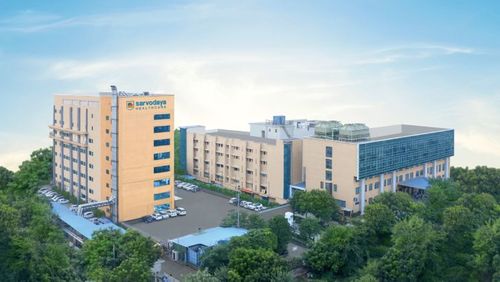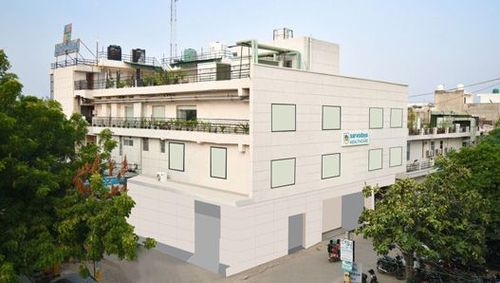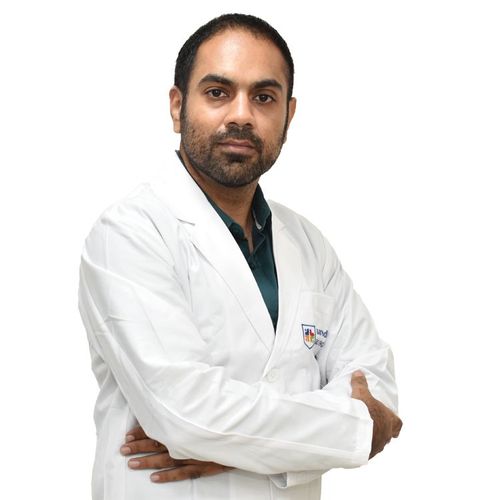Overview
Abdominal tuberculosis affects organs such as the intestines, peritoneum, hepatobiliary system, pancreas, and lymph nodes, often spreading from pulmonary TB through infected sputum, contaminated milk, or via blood and lymphatic routes. The ileocecal region and peritoneum are most commonly involved.
At Sarvodaya, our expert Best Gastroenterologist in Delhi NCR provide comprehensive care, combining advanced diagnostics, anti-tuberculousis therapy, supportive care, and surgical intervention when needed, ensuring personalised, evidence-based management for optimal patient outcomes.
Abdominal Tuberculosis Symptoms
- Chronic abdominal pain (often right lower quadrant)
- Unexplained weight loss
- Persistent fever
- Night sweats
- Loss of appetite
- Altered bowel habits (diarrhoea or constipation)
- Abdominal distension
- Feeling of abdominal mass or fullness
- Ascites (fluid in abdomen)
- Enlarged lymph nodes
- Fatigue or general weakness
- Blood in stool
- Nausea or vomiting
- Intestinal obstruction
Causes of Abdominal Tuberculosis
- Infection with Mycobacterium tuberculosis
- Reactivation of latent TB
- Immunocompromised conditions
- Close contact or history of pulmonary TB
- Malnutrition and poor living conditions
Diagnosis of Abdominal Tuberculosis
Accurate diagnosis of abdominal tuberculosis confirms infection, identifies the extent of involvement, and guides effective treatment, ensuring patients receive expert care at Sarvodaya, the leading Gastroenterology Hospital in Faridabad.
- Clinical assessment and labs – Detailed history and physical examination for abdominal masses, ascites, and lymphadenopathy. Laboratory tests include tuberculin skin test, interferon‑gamma release assays, and blood tests for anaemia and inflammatory markers.
- Imaging studies – Abdominal ultrasound, contrast-enhanced CT scan, and MRI help detect lymphadenopathy, bowel wall thickening, and ascites characteristic of TB.
- Endoscopy and biopsy – Colonoscopy with tissue sampling allows detection of acid-fast bacilli for definitive diagnosis.
- Ascitic fluid analysis – Evaluates protein levels, serum-ascites albumin gradient, lymphocyte predominance, and adenosine deaminase levels.
- Laparoscopy (select cases) – Direct visualisation and tissue sampling for confirmation when diagnosis remains uncertain.
- Multidisciplinary approach – Pulmonologists, gastroenterologists, radiologists, and infectious disease specialists collaborate to plan personalised treatment.
Treatment of Abdominal Tuberculosis
- Standard anti-tuberculous therapy (ATT) – A four-drug regimen (isoniazid, rifampicin, pyrazinamide, ethambutol) for two months, followed by isoniazid and rifampicin for four months, remains the mainstay of abdominal tuberculosis treatment, offering high cure rates and good compliance.
- Medical management – Most cases respond to ATT alone, avoiding unnecessary surgery.
- Surgical intervention – Reserved for complications such as non-resolving intestinal obstruction, perforation, abscesses, or fistula formation.
- Endoscopic therapies – Balloon dilatation is used for gastrointestinal strictures when needed.
- Multidisciplinary care – Gastroenterologists, surgeons, radiologists, and infectious disease specialists collaborate to personalise treatment and ensure optimal outcomes.
Prevention & Risk Reduction
At Sarvodaya Hospital, we guide you at every step to prevent abdominal tuberculosis, reduce complications, and maintain lifelong health.
- Early detection and treatment of pulmonary TB – Timely diagnosis and completing prescribed therapy lowers the risk of abdominal TB.
- Safe food and hygiene practices – Avoid unpasteurised dairy, maintain proper sanitation, and ensure good nutrition to support immunity.
- Vaccination and high-risk screening – BCG vaccination and regular check-ups for individuals with HIV, diabetes, or TB contacts help early identification.
- Complete anti-tuberculous therapy – Ensures prevention of reactivation, drug resistance, and limits how abdominal tuberculosis spreads.
Pre and Post Treatment Care
Before treatment
- Comprehensive evaluation, including nutritional assessment, screening for pulmonary TB and HIV co‑infection
- Baseline investigations: complete blood count, liver function tests, kidney function assessment, chest X‑ray
- Patient education about the disease process, treatment duration, medication adherence, and potential side effects
- Nutritional counselling and dietary planning to improve overall health status and treatment tolerance.
After treatment
- Regular monitoring for treatment response through clinical assessment, weight gain, and symptom improvement
- Monthly follow‑ups to assess medication tolerance, side effects, and adherence to the treatment regimen
- Laboratory monitoring for drug‑induced hepatotoxicity and other adverse effects
- Nutritional support with a high‑protein, vitamin‑rich diet and management of malabsorption if present
- Long‑term follow‑up for detecting treatment failure, relapse, or late complications like stricture formation.











